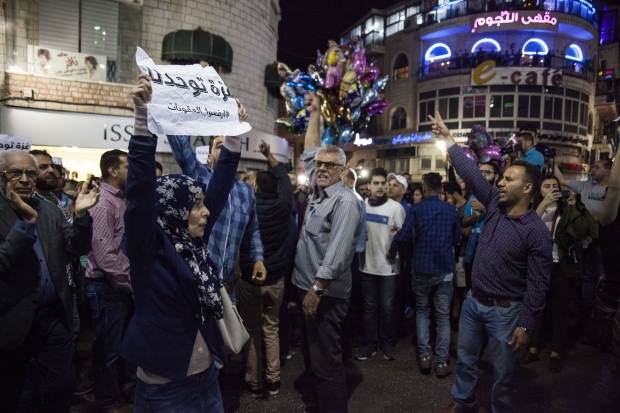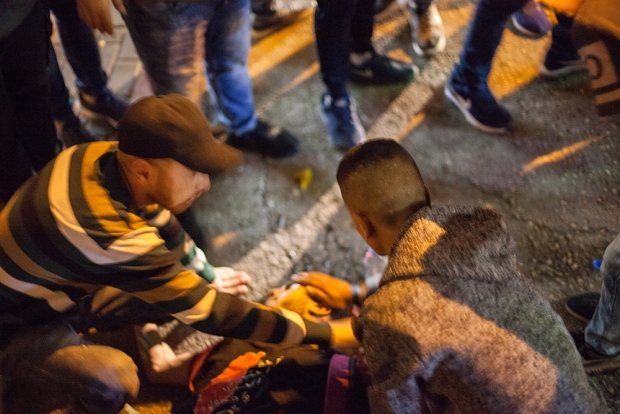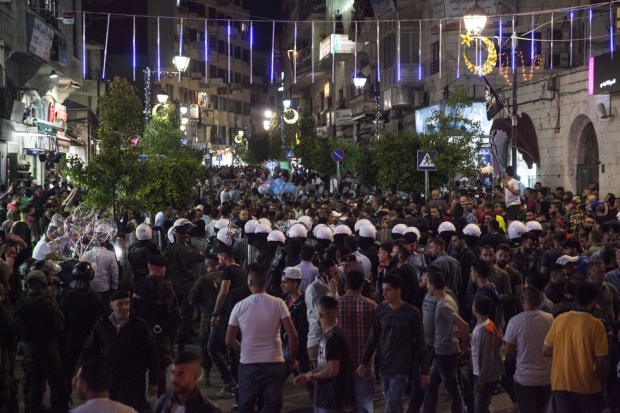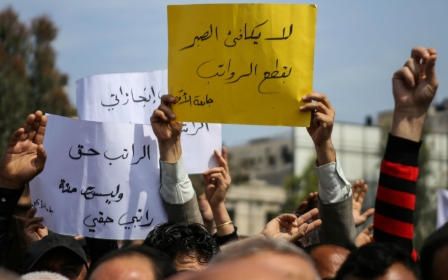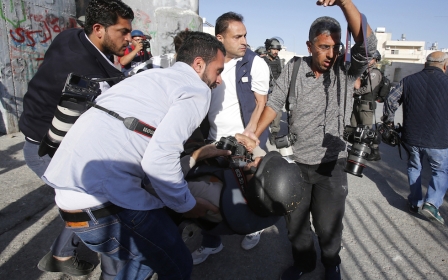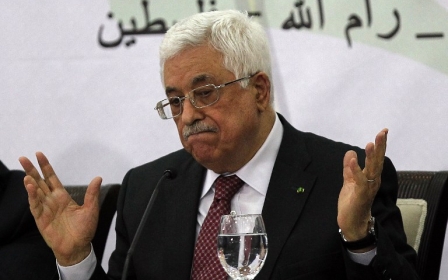Palestinian forces break up Ramallah protest in support of Gaza
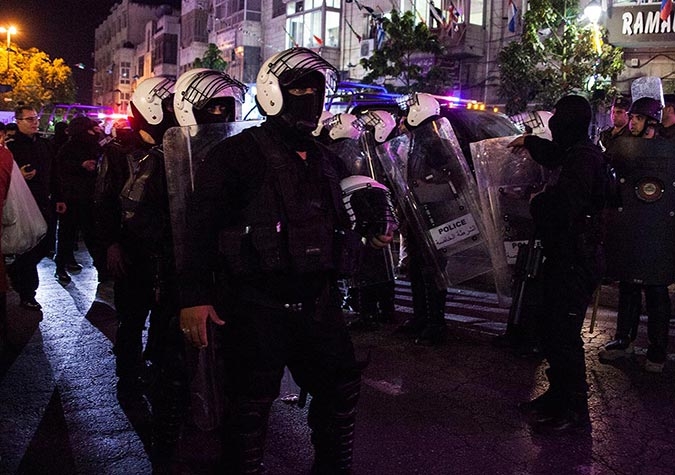
RAMALLAH, Occupied West Bank - Palestinian security forces used sound grenades, tear gas and violent force to disperse an anti-government protest in the occupied West Bank on Wednesday night, as hundreds demonstrated against the Palestinian Authority's punitive measures against the Hamas-controlled Gaza Strip.
Crowds of protesters in Ramallah chanted and hoisted signs calling for an end to PA sanctions against Gaza before they were quickly cut off as Palestinian National Security Forces threw sound grenades and fired tear gas into the crowd.
Security forces in riot gear also wielded batons and used Taser weapons against protesters, with dozens of people carried away and arrested.
Police yelled at everyone in the street to put their phones away and told them not to take photos – journalists included.
Many of those who did take photos were arrested or at least detained briefly by swarms of police officers who attempted to break or confiscate cameras and erase memory cards.
Those who were arrested, at least 50 as of midnight including two foreign journalists, were carried away by police while being beaten with batons, punched and kicked.
'I’ve never witnessed this amount of violence, to be honest, towards Palestinian protesters by the security forces'
- Dina J, activist
Young girls and women were among those who this reporter saw being carried away, screaming and struggling.
About 10 people were taken to hospital, where they had their identification documents confiscated by police.
“I’ve never witnessed this amount of violence, to be honest, towards Palestinian protesters by the security forces,” activist Dina J told Middle East Eye.
Supporters of Palestinian Authority President Mahmoud Abbas's Fatah party, who wore Fatah caps to identify themselves, staged a counter-demonstration alongside the protest, leading to street fights and clashes between the rival crowds as security forces looked on.
“They were able to protest freely. They were not attacked, they were protected by the police,” J stated.
“They weren’t arrested because they belong to the regime. We had a serious fear that they were there to attack and demonise the protesters and start internal clashes between people on the street.”
Akram Rjoub, who until Wednesday was the PA's governor of Nabuls, reacted fiercely when asked about the security forces' response to the protests.
״The NGOs' employees have gone to the streets to curse at us, they who get funding of half the Palestinian people’s budget," he said.
"We will beat the shit out of any of them who dares say we are not nationalists, and we say they are not nationalists. We are all for Gaza but we will not tolerate anyone who targets us.״
'Our demands are just'
On multiple occasions people among the Fatah supporters could be seen dragging protesters over to stationed police vans, beating them and then throwing them inside, suggesting that some of them may have been undercover members of the security forces, a tactic also used by Israeli forces in the West Bank.
But activist Fadi Quran told MEE that the protesters would not be intimidated and planned to continue their campaign in support of the people of Gaza.
“Our demands are just and the tactics that we’re using are just, and we will not back down and be intimidated. I will not allow the PA in any way to prevent us from moving this campaign forward until we achieve our goals,” said Quran.
Wednesday night's protest followed an earlier demonstration in Ramallah, the PA's administrative centre, on Sunday in protest at sanctions imposed by the PA against Gaza since Hamas took control of the coastal enclave in 2007 after winning elections there in 2006.
Since then, the PA and Hamas have failed to resolve their acrimonious power struggle, with numerous attempts at forming a unity government falling flat, effectively leaving Gaza under the control of a Hamas-led administration separate from the PA operating in the West Bank.
This week's protests come more than a month since the Palestinian Authority cut in half the salaries of its estimated 50,000 employees in the Gaza Strip without warning.
Last summer, the PA stopped paying for Gaza’s electricity, leaving the enclave’s residents with only two hours of electricity a day - compared to a paltry eight hours previously.
The Times of Israel reported on Monday that Israel’s Knesset had pushed forward a motion to withhold funds to the PA for damages caused by incendiary kites flown from Gaza into southern Israel - raising the spectre of further retaliatory measures by the PA in Gaza.
While the PA’s actions in Gaza have undeniably affected its popularity there, the governing body also faces criticism and distrust in the occupied West Bank.
According to an April poll by the Palestinian Center for Policy and Survey Research (PCPSR), 63 percent of Palestinians believe that people cannot criticise the PA without fear, whereas 52 percent of respondents saw the PA as a “burden” on the Palestinian people.
The protests come at a difficult time for 83-year-old Abbas, who was recently hospitalised for a week with a lung infection.
Polls show the majority of Palestinians want him to resign.
He is also facing potential isolation after cutting off all contact with US President Donald Trump's administration, because of its pro-Israel bias which has seen it recognise Jerusalem as Israel’s capital, and seek to push a so-called “deal of the century” peace settlement on the PA leadership through pressure exerted via Saudi Arabia.
'Abbas has given the orders'
The Palestinian National Council – the parliamentary body of the Palestinian Liberation Organisation (PLO) – has called for sanctions against Gaza to be lifted, and many Palestinians hold Abbas directly responsible for keeping them in place.
“The excuses move from one extreme to another, sometimes they say there are no sanctions, they’re just technical difficulties, other times they say they’re right to impose sanctions on Gaza,” Quran said.
“Abbas has given the orders for these sanctions to remain and as the president, as the person who assigned this government, he is personally where the book ends ... He can decide if these sanctions are removed today.”
Masarat, the Palestinian centre for policy research and strategic studies, reiterated the divide between the government and parliament.
“It is worth noting that numerous members of Fatah's Central Committee and its spokespersons, and especially its leaders in the Gaza Strip, have held the Palestinian [PA] government responsible for the failure to lift the sanctions and implement the president's decision,” Masarat stated on its website.
“The aim [of the sanctions], it is said, is to exert pressure on Hamas's de facto authority in the Gaza Strip to force it to empower the PA in the entire Strip or face a popular revolution.”
Hanan Ashrawi, a member of the PLO's executive committee, issued a press release after Wednesday's protest calling to “safeguard the rights and freedoms of all Palestinians” referring to “the principles enshrined in the Basic Law and the International Covenant on Civil and Political Rights".
“Citing the justification of the Eid al-Fitr holiday for the banning of demonstrations and tonight’s use of tear gas and stun grenades by Palestinian security forces to disperse Palestinian demonstrators who were expressing their solidarity with their brothers and sisters in Gaza is unacceptable,” she said.
Ashrawi was referring to a ban on protests imposed by Palestinian authorities until after the Muslim festival marking the end of Ramadan, which is expected to take place on Friday, to "facilitate citizens to conduct their normal lives".
But Masarat said in its statement that the protests had demonstrated the unity of Palestinians in the West Bank and Gaza.
'What happened in Ramallah is very significant because it confirms that the Palestinian people are a single nation'
- Masarat statement
“What happened in Ramallah is very significant because it confirms that the Palestinian people are a single nation that shares the same fate despite the distances, circumstances and … the divisions over the national cause,” Masarat stated.
That sentiment was echoed by Dina J, the activist, who told MEE: “We are one nation and one people and we have absolutely all the rights to protest demanding this end to sanctions.
“We are under the same oppressive regime. The [PA] violated the very basic rights for us to protest and express our opinion and to have a peaceful assembly. The acts on behalf of the PA are the illegal acts.
“I think it was eye-opening for everybody to see the brutality that the PA used against peaceful protesters demanding very basic rights for the Palestinians living in Gaza."
The Campaign to Lift PA Sanctions on Gaza also condemned the PA's use of force and continuing implementation of sanctions.
“These sanctions are daggers placed in the heart of our cause and our unity. This is a dagger which accentuates division and political and social rift. Such acts on behalf of the PA towards Gaza are further widening the internal political split between the two ruling parties of the West Bank and Gaza,” it said in a statement.
Palestinian Authority officials did not respond to requests for comment on Thursday.
- Chloe Benoist contributed to this report.
Middle East Eye propose une couverture et une analyse indépendantes et incomparables du Moyen-Orient, de l’Afrique du Nord et d’autres régions du monde. Pour en savoir plus sur la reprise de ce contenu et les frais qui s’appliquent, veuillez remplir ce formulaire [en anglais]. Pour en savoir plus sur MEE, cliquez ici [en anglais].


